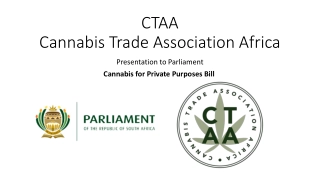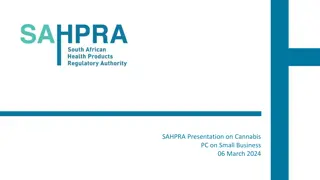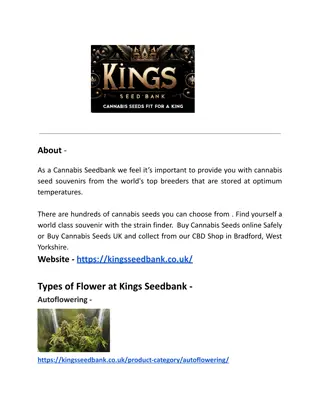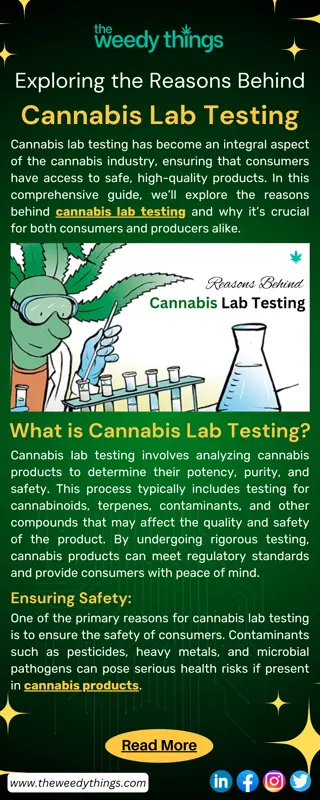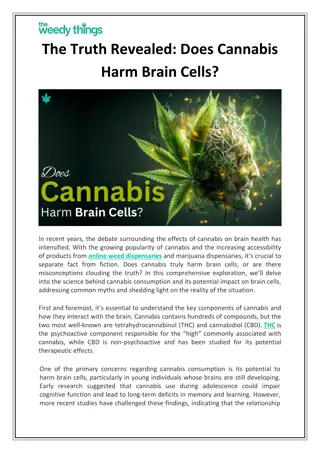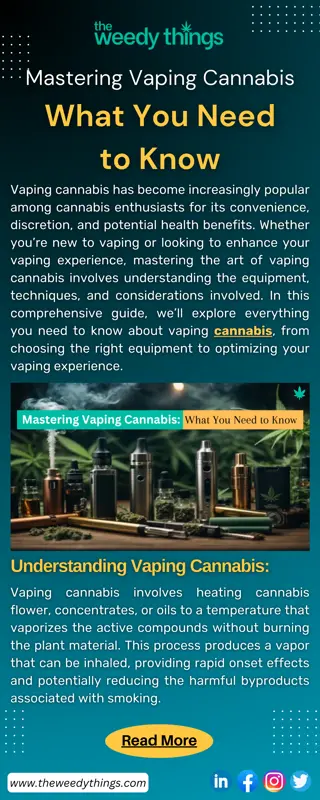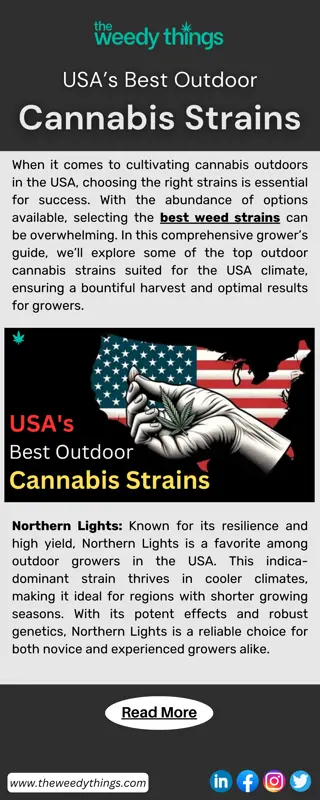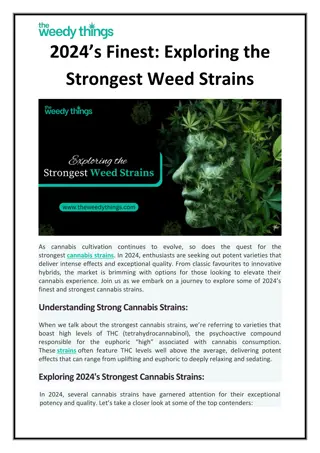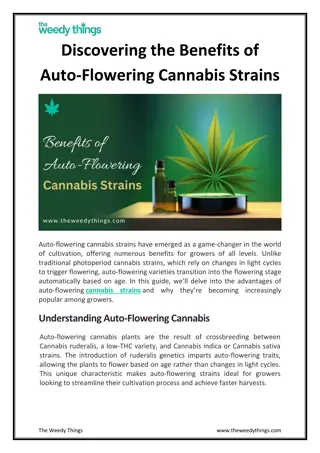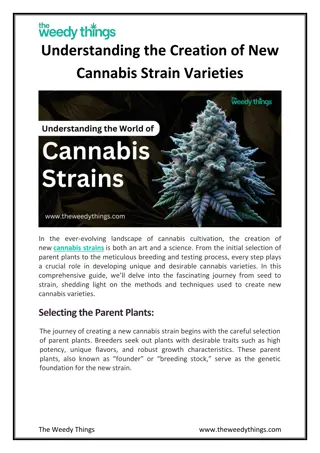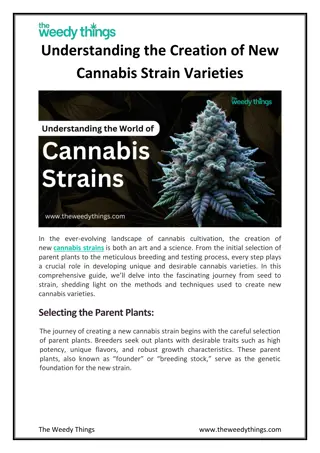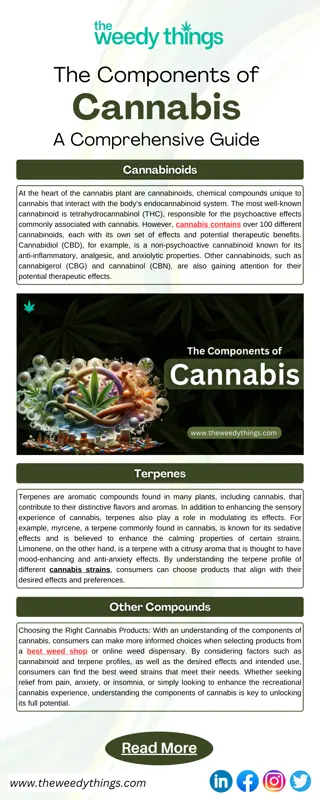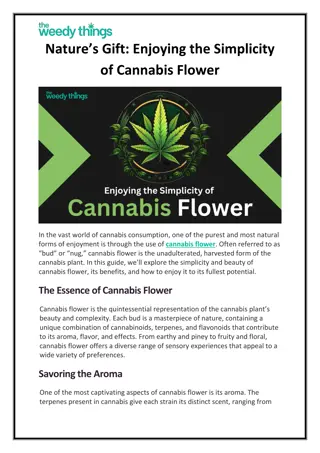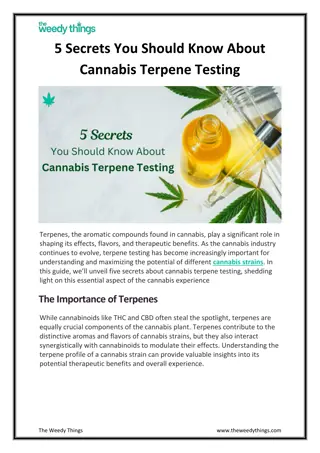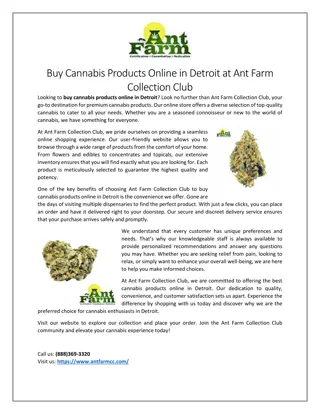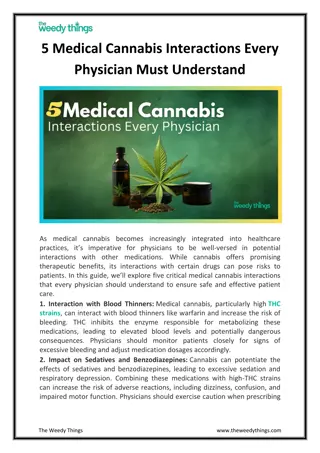
Minnesota Workplace Implications of Cannabis Legalization
"Learn about the impact of the new cannabis legalization law in Minnesota on workplace policies, drug testing, employer actions, and employee rights regarding cannabis use and possession. Understand the restrictions and allowances under the new law and how employers need to adapt their policies to comply with the changing legal landscape."
Download Presentation

Please find below an Image/Link to download the presentation.
The content on the website is provided AS IS for your information and personal use only. It may not be sold, licensed, or shared on other websites without obtaining consent from the author. If you encounter any issues during the download, it is possible that the publisher has removed the file from their server.
You are allowed to download the files provided on this website for personal or commercial use, subject to the condition that they are used lawfully. All files are the property of their respective owners.
The content on the website is provided AS IS for your information and personal use only. It may not be sold, licensed, or shared on other websites without obtaining consent from the author.
E N D
Presentation Transcript
CANNABIS AT THE WORKPLACE Greg Griffiths July 2023
Legalization of Cannabis Use and possession of Marijuana is presently illegal under Minnesota and federal law. Low dose hemp-based products can be purchased and used legally in Minnesota. Medical cannabis can be used legally in Minnesota. Users of medical cannabis exempted from some employment related testing. Users of medical cannabis not exempted if appearing under the influence. 2
Legalization of Cannabis Under current law, employers can maintain drug free workplaces and enforce drug free workplace policies. Minnesota employers can take employment action against employees who they believe are under the influence. Focus on the performance. Employers can test employees for drug use (including cannabis) if they have a testing program in place that meets the requirements of Minnesota law. Stringent requirements for testing set out in Minn. Stat. 181. For example, Employees keep their job following a failed test if they take appropriate steps. Applicants can be denied employment following a failed test without medical cannabis card. Federal DOT requirements are in place. 3
The New Law Beginning on August 1, 2023, the law will permit recreational cannabis use for adults 21 and over. It will remain illegal under federal law. It will be legal to have up to two pounds of cannabis at one s home and to transport up to two ounces while in public. The law allows individuals to grow up to eight flowering plants, with no more than four being mature at a single residence, without a state license. The law creates a framework to license businesses to cultivate, manufacture and sell cannabis at retail dispensaries. However, the law will have no impact on Federal DOT requirements and cannabis will remain illegal under federal law. 4
The New Law Employers (who are not subject to DOT testing requirements) who test for drug use will be prohibited from testing for cannabis. This will require employers to modify drug testing policies and testing processes. 5
The New Law Minnesota has a consumption of lawful products act which prevents employers from discriminating against employees for non-work use of alcohol and tobacco products. The law will be modified to add cannabis use to the list. This means employer will not be able to take an applicant or employee s non-work use of cannabis into consideration. 6
Can Employees Use Cannabis At Work? No. Employers will not be required to permit employee use, possession, or distribution of cannabis products at work. Employers may prohibit being under the influence of cannabis at work. These requirements should be announced and placed in employer policies. It should be made clear that use and being under the influence is not permitted. 7
Can Employees Be Disciplined For Use of Cannabis At Work? Yes Employes who are under the influence as subject to discipline. Under the influence means the employee does not possess the clearness of intellect and control the employee would otherwise have. This must be set out in an employer s work rules. Employers should modify their policies. Managers and supervisors should be trained on the policy and expectations. 8
Can Cannabis Be Used in Public Places Or At Your Location? No. Adults may only use cannabis for recreational purposes in certain locations. Public use is limited to businesses or events licensed for on-site consumption. Smoking cannabis is prohibited on public places. 9
Can Employers Test Job Applicants for Cannabis? No, unless it is required by federal law or other regulation. Employers may not test for cannabis and may not refuse to hire someone because of known cannabis use or when cannabis shows up on a drug test. There is an exception: The new law provides that for certain positions cannabis is still considered a drug and employers may test applicants for cannabis. Safety-sensitive positions as defined. Peace officers, firefighters, positions requiring face-to-face care, education, training, supervision, counseling, consultation, assistance to children, vulnerable adults or healthcare patients, a position requiring a CDL, a position funded by a federal grant or any other position that requires testing for cannabis by state or federal law. 10
What Is A Safety-Sensitive Position? It is defined by law as a means a job, including any supervisory or management position, in which an impairment could threaten the health or safety of a person. 11
What About Reasonable Suspicion Testing Of Current Employees? After August 1, 2023, employers with a proper testing policy may test for cannabis if there is reasonable suspicion the employee: Violated a written rule regarding the use, possession or sale or alcohol, drugs, or cannabis while working on the employer s premises; Focus on the performance Has sustained a personal injury or caused another employee to sustain a personal injury; Has caused a work-related accident or was operating machinery, equipment or vehicles. 12
What About Random Testing? After August 1, 2023, employers can conduct random cannabis testing for safety-sensitive positions. 13
Are Employers Required To Test? Not unless it is required by other federal or state law. 14
Do Policies Need Revision? Employers should educate employees on expectations. Drug free workplace policies should be revisited. Policies should be revised as needed to clarify the impact of the new law. Employers that test for alcohol and drugs should modify testing policies/procedures. 15
Any Questions? Greg Griffiths Dunlap & Seeger, P.A. (507) 288-9111 gjg@dunlaplaw.com 16
WINONA CHAMBER OF COMMERCE 2023 LEGISLATIVE PARENTAL LEAVE, PAID SICK AND SAFETY LEAVE Greg Griffiths June 22, 2023
Parental Leave As of now, larger (21+) employers must grant certain employees 12 weeks of unpaid Parental Leave. Employee had to be employed during the preceding 12 months. Employee had to work at least half-time during preceding 12 months. Starting July 1, 2023, 12 weeks of unpaid Parental Leave applies to all employers, not just larger (21+) employers. One year of employment eligibility requirement eliminated. Starts at commencement of employment. Half time requirement eliminated. Includes guaranteed reinstatement rights. 18
Paid Sick and Safe Leave Starting January 1, 2024, at the commencement of employment, employees earn 1 hour of sick and safe leave for each 30 hours worked up to 48 hours per year. Unused hours carry over up to a total of 80 hours. The law will have no effect on employer policies already in place if they meet or exceed the requirements of the law. No more use it or lose regarding sick and safety leave. Employers must give notice to employees and include notice in employee handbooks, if any. DOLI is preparing a model notice. 19
Paid Family and Medical Leave Starting in 2026, all employees get paid family and medical leave. Types of leave: Medical leave to address an employee s own serious health conditions, including pregnancy. Parental leave to provide time to bond with a new child. Caregiving leave to allow employees leave to care for a loved one with a serious health condition. Safety leave related to sexual and domestic violence. Military-related leave due to the impact of a military deployment. 20
Paid Family and Medical Leave Employees can take 12 weeks of medical leave (for themselves or to care for a family member), including for pregnancy or recovery from childbirth and up to 12 weeks for all other types of leave. Employees who need leave in both categories can take up to a total of 20 weeks in a benefit year. A family member will include an employee s spouse or domestic partner, child, parent, sibling, grandchild, or grandparent, as well as such relationships by marriage. The definition also includes any other individual who has a relationship with the employee that creates an expectation that the employee would care for the individual, regardless of whether they live together. Employer can require leaves to run concurrently with FMLA. 21
Paid Family and Medical Leave Minnesota s new law will create an insurance system. Employees will apply for benefits, and the state will process the claim and pay benefits out of a state insurance fund. The amount employees will receive will vary depending on how much an employee earns. Lower income workers will receive a higher percentage of their income with a sliding scale towards a lower percentage as workers earn more. Benefits will be capped at a 100% of the Minnesota s average weekly wage. 22
Paid Family and Medical Leave Initial funding will come from an appropriation from the state s general fund. After that funded with payroll deductions split evenly between employers and employees. On January 1, 2026, the rate will be 0.7%, meaning employees and employers will each contribute 0.35% of income up to the maximum income subject to contributions for social security. The amounts will be adjusted on an annual basis. Employers with fewer than 30 employees will pay a reduced amount. 23
Paid Family and Medical Leave Employers will be able to request permission to provide benefits through a private plan. With an approved private plan employees will be entitled to the same benefits they would have received through the public plan. 24
Paid Family and Medical Leave Employers must post notice of the plan. Includes anti-retaliation provisions and guarantees job restoration rights. 25
Nursing Mothers Existing law requires employers to provide time to nursing mothers to express milk for one year after the birth of the child. Requires a private space with a power outlet, other than a bathroom etc. Starting July 1, 2023, No longer limited to the first 12 months after birth of the child. Employers cannot deny breaks for any reason. Can no longer deny breaks because they unduly disrupt employer operations. 26
Expanded Pregnancy Accommodations Employees may take longer restroom, food, and water breaks without supporting documentation. Added new possible accommodations including temporary leaves, modified work schedules or job assignments, and more frequent or longer breaks to the list of potential reasonable accommodations. The law also adds broader discrimination and retaliation protections. 27
Non-Compete Agreements New Non-Compete Agreements are banned after July 1, 2023, for employees and contractors. The law is not retroactive. Can still use them associated with the sale or dissolution of a business. Employers cannot use choice of law provisions for other states to avoid the law if the employees work here. Can still use confidentiality/non-disclosure policies/agreements to protect against unfair competition. 28
No Captive Audience Meetings Allowed Mandatory employee meetings on union, political or religious messages are not allowed. Expect litigation on freedom of speech grounds. 29
Crown Act Prohibits discrimination based on certain hairstyles. The CROWN Act, amends the Minnesota Human Rights Act s definition of race to include traits associated with race, including but not limited to hair texture and hair styles such as braids, locs and twists. 30
Inquiries Into Applicants Salary History Prohibited Employers are prohibited from inquiring into, considering, or requiring disclosure from any source the pay history of an applicant for employment. Employees are free to share it for the purposes of seeking an increase in compensation from a new employer. 31
Updating I-9s Completed Remotely During the COVID-19 pandemic, U.S. Immigration and Customs Enforcement (ICE) allowed employers the flexibility of completing the new employee Form I-9 process remotely. This flexibility is coming to an end July 31, 2023, followed by a 30-day grace period. 32
Updating I-9s Completed Remotely Before the August 30, 2023 deadline, employers must physically inspect the original documents related to all Form I-9 s completed remotely. Employers complete this by adding information to the Additional Information box on page 2 of the Form I-9. The additional information should include a description of the documents that were physically examined at the workplace, the date of the examination, and the name of the examiner. 33
Updating I-9s Completed Remotely Employers should identify all I-9 Forms completed remotely. Steps should be taken to ensure each is properly reviewed and annotated. ICE is expected to publish a final rule later in 2023 that will provide detail on when in person alternatives are permissible in the future. Minnesota now issues undocumented workers drivers licenses. Remember that for I-9 purposes a drivers license can prove identity, but not the lawful ability to work. 34
Any Questions? Greg Griffiths Dunlap & Seeger, P.A. (507) 288-9111 gjg@dunlaplaw.com 35

